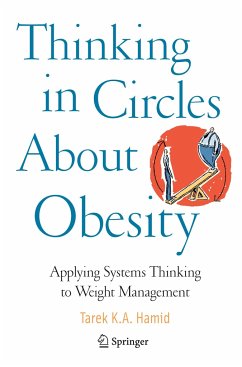This book unites systems thinking and information technology to offer powerful insights and practical strategies to combat obesity. It applies creative, business-tested techniques to personal health, presenting a novel approach to addressing obesity.
Today's children may well become the first generation of Americans whose life expectancy will be shorter than that of their parents. The culprit, public health experts agree, is obesity and its associated health problems. Heretofore, the strategy to slow obesity's galloping pace has been driven by what the philosopher Karl Popper calls ''the bucket theory of the mind. '' When minds are seen as containers and public understanding is viewed as being a function of how many scientific facts are known, the focus is naturally on how many scientific facts public minds contain. But the strategy has not worked. Despite all the diet books, the wide availability of reduced-calorie and reduced-fat foods, and the broad publicity about the obesity problem, America's waistline continues to expand. It will take more than food pyramid images or a new nutritional guideline to stem obesity's escalation. Albert Einstein once observed that the significant problems we face cannot be solved at the samelevel of thinking we were at when we created them, and that we would have to shift to a new level, a deeper level of thinking,tosolvethem. Thisbookarguesfor,andpresents,adifferent perspective for thinking about and addressing the obesity problem: a systems thinking perspective. While already commonplace in engineering and in business, the use of systems thinking in personal health is less widely adopted. Yet this is precisely the setting where complexities are most problematicandwherethestakesarehighest.
Today's children may well become the first generation of Americans whose life expectancy will be shorter than that of their parents. The culprit, public health experts agree, is obesity and its associated health problems. Heretofore, the strategy to slow obesity's galloping pace has been driven by what the philosopher Karl Popper calls ''the bucket theory of the mind. '' When minds are seen as containers and public understanding is viewed as being a function of how many scientific facts are known, the focus is naturally on how many scientific facts public minds contain. But the strategy has not worked. Despite all the diet books, the wide availability of reduced-calorie and reduced-fat foods, and the broad publicity about the obesity problem, America's waistline continues to expand. It will take more than food pyramid images or a new nutritional guideline to stem obesity's escalation. Albert Einstein once observed that the significant problems we face cannot be solved at the samelevel of thinking we were at when we created them, and that we would have to shift to a new level, a deeper level of thinking,tosolvethem. Thisbookarguesfor,andpresents,adifferent perspective for thinking about and addressing the obesity problem: a systems thinking perspective. While already commonplace in engineering and in business, the use of systems thinking in personal health is less widely adopted. Yet this is precisely the setting where complexities are most problematicandwherethestakesarehighest.
From the reviews: "Systems thinking is a perspective and a set of conceptual tools that enable us to understand the structure and predict the behavior of complex systems. While already commonplace in engineering and in business, the use of systems thinking impersonal health is less widely adopted. Yet health is precisely the setting where dynamic complexity is most problematic and where the stakes are highest. Thinking in Circles about Obesity: Applying Systems Thinking to Weight Management, aims to fill this gap. The book applies systems thinking to personal health in a form that's accessible to the general reader with the hope that it would have a profound influence on how ordinary people think about and manage their health and well being." BehavioralHealthCentral.com, December 30, 2009 "Commonplace in engineering and in business, the use of systems thinking in personal health is less widely adopted. ... health is precisely the setting where dynamic complexity is most problematic and where the stakes are highest. Thinking in Circles About Obesity: Applying Systems Thinking to Weight Management ... aims to fill this gap. The book applies systems thinking to personal health in a form that's accessible to the general reader ... ." (The Systems Thinker, Vol. 20 (10), December/2009 - January/2010) "'Thinking in Circles About Obesity' and is by Tarek K. A. Hamid ... . I first saw the book reviewed while doing a Google Fast Flip search for 'obesity' and was intrigued by it. ... I have a copy and read ... I'm really excited by it. It's well-researched (with about 300+ endnotes and index), written for the lay person, and explains very well both how complex weight loss is and how we can better think about it." (Stephen Colbert, Weight Watchers, May, 2009)








